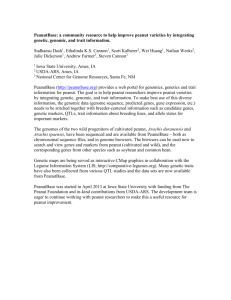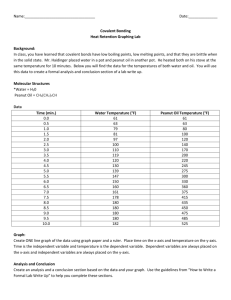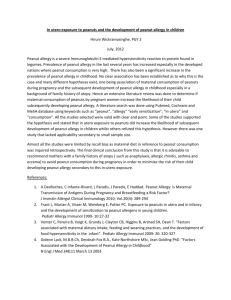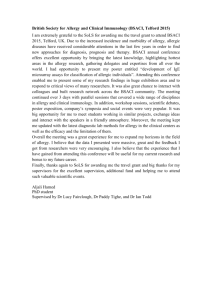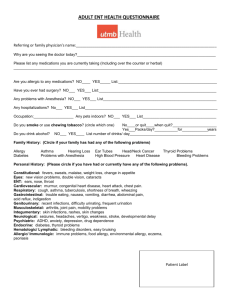Arachis oil in medicines-what are the risks of developing peanut
advertisement
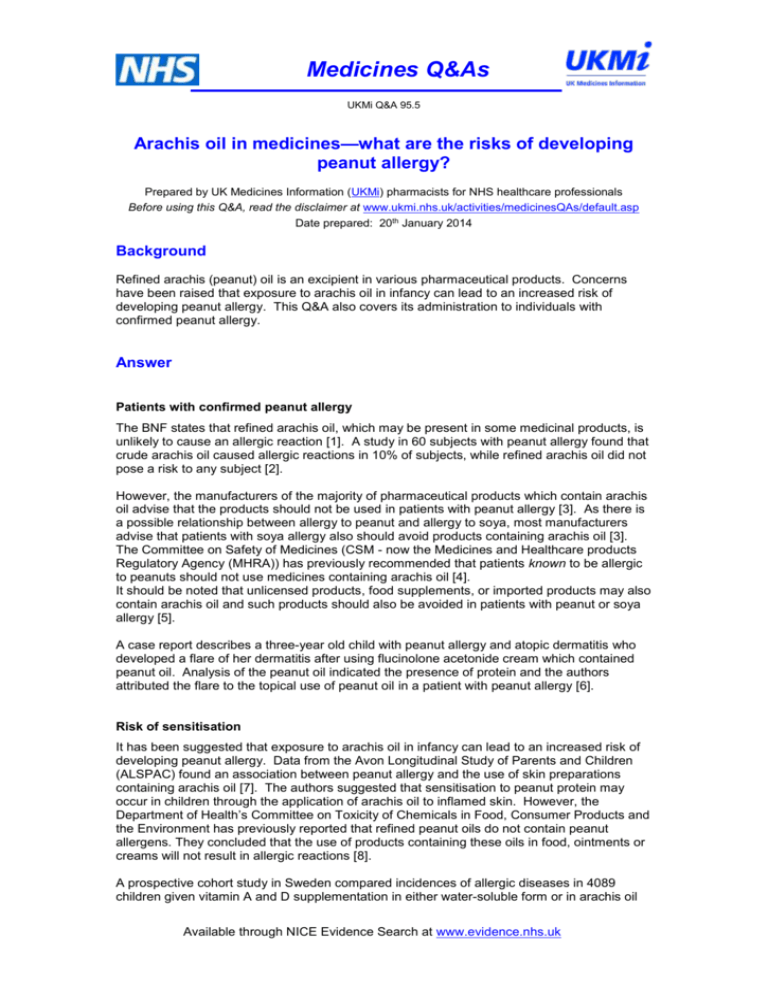
Medicines Q&As UKMi Q&A 95.5 Arachis oil in medicines—what are the risks of developing peanut allergy? Prepared by UK Medicines Information (UKMi) pharmacists for NHS healthcare professionals Before using this Q&A, read the disclaimer at www.ukmi.nhs.uk/activities/medicinesQAs/default.asp Date prepared: 20th January 2014 Background Refined arachis (peanut) oil is an excipient in various pharmaceutical products. Concerns have been raised that exposure to arachis oil in infancy can lead to an increased risk of developing peanut allergy. This Q&A also covers its administration to individuals with confirmed peanut allergy. Answer Patients with confirmed peanut allergy The BNF states that refined arachis oil, which may be present in some medicinal products, is unlikely to cause an allergic reaction [1]. A study in 60 subjects with peanut allergy found that crude arachis oil caused allergic reactions in 10% of subjects, while refined arachis oil did not pose a risk to any subject [2]. However, the manufacturers of the majority of pharmaceutical products which contain arachis oil advise that the products should not be used in patients with peanut allergy [3]. As there is a possible relationship between allergy to peanut and allergy to soya, most manufacturers advise that patients with soya allergy also should avoid products containing arachis oil [3]. The Committee on Safety of Medicines (CSM - now the Medicines and Healthcare products Regulatory Agency (MHRA)) has previously recommended that patients known to be allergic to peanuts should not use medicines containing arachis oil [4]. It should be noted that unlicensed products, food supplements, or imported products may also contain arachis oil and such products should also be avoided in patients with peanut or soya allergy [5]. A case report describes a three-year old child with peanut allergy and atopic dermatitis who developed a flare of her dermatitis after using flucinolone acetonide cream which contained peanut oil. Analysis of the peanut oil indicated the presence of protein and the authors attributed the flare to the topical use of peanut oil in a patient with peanut allergy [6]. Risk of sensitisation It has been suggested that exposure to arachis oil in infancy can lead to an increased risk of developing peanut allergy. Data from the Avon Longitudinal Study of Parents and Children (ALSPAC) found an association between peanut allergy and the use of skin preparations containing arachis oil [7]. The authors suggested that sensitisation to peanut protein may occur in children through the application of arachis oil to inflamed skin. However, the Department of Health’s Committee on Toxicity of Chemicals in Food, Consumer Products and the Environment has previously reported that refined peanut oils do not contain peanut allergens. They concluded that the use of products containing these oils in food, ointments or creams will not result in allergic reactions [8]. A prospective cohort study in Sweden compared incidences of allergic diseases in 4089 children given vitamin A and D supplementation in either water-soluble form or in arachis oil Available through NICE Evidence Search at www.evidence.nhs.uk Medicines Q&As for at least the first year of life. The majority of children (90%) received supplementation in arachis oil. At 4 years of age, children who received vitamin supplementation in arachis oil showed a borderline statistically significantly lower incidence of peanut allergy; 5% of children who received vitamin supplementation in arachis oil were sensitised to peanut compared with 9% of children who received the vitamins in water-soluble form (P=0.05) [9]. The CSM advised in 2003 that there is insufficient evidence to conclude that exposure to medicinal products containing arachis oil leads to sensitisation to peanut protein [6]. Summary There have been concerns as to whether pharmaceutical products containing arachis oil are appropriate for individuals with peanut allergies or that exposure to them may increase the risk of developing peanut allergy. Although there is some evidence that exposure to refined arachis oil does not pose a risk to patients with peanut allergy, the Summary of Product Characteristics (SPCs) of products which contain arachis oil state that they should not be used by patients with an allergy to peanuts (or soya). Unlicensed products which contain arachis oil also should not be used by patients with an allergy to peanuts or soya. The CSM have recommended that patients known to be allergic to peanuts should not use medicines containing arachis oil. This includes unlicensed products, food supplements, or imported products containing arachis oil. The CSM have previously advised that there is insufficient evidence to conclude that exposure to medicinal products containing arachis oil leads to sensitisation to peanut protein. Limitations Data in this area are limited and there are no prospective randomized studies to inform the decision. This review only covers the use of pharmaceutical grade arachis oil in medicinal products. References 1. Joint Formulary Committee. British National Formulary (online) London: BMJ Group and 2. 3. Pharmaceutical Press <http://www.medicinescomplete.com> [Accessed on 10th January 2014] Hourihane J O'B, Bedwani SJ, Dean TP & Warner JO. Randomised, double blind, crossover challenge study of allergenicity of peanut oils in subjects allergic to peanuts, BMJ 1997; 314: 1084-1088 Summary of Product Characteristics of products containing arachis oil (as of January 16th 2014): Abidec Multivitamin Drops (Omega Pharma Ltd, 30th November 2012); AT10 (Intrapharm Labs Ltd, January 2013); Boots Chilblain cream (Boots Co plc, June 2004); Boots Corn Removal Plasters (Boots Co plc, December 2007); Cerumol Ear Drops (Thornton & Ross Ltd, 19th October 2013); Colpermin IBS Relief Capsules (McNeil Ltd, 13th November 2013); Deca Durabolin 50mg/ml (Merck, Sharp & Dohme Ltd 29th December 2011); Dimercaprol Injection BP (Amdipharm Mercury Company Ltd, June 2013); Fuller Earth Cream (Thornton & Ross Ltd, 9th November 2012); Fultium D3 800IU capsules (Internis Pharmaceuticals 29 th June 2013); Gynest 0.01% Cream (Malborough Pharmaceuticals Ltd, 10 th June 2011); Metvix 160 mg/g cream (Galderma (UK) Ltd, December 2012); Naseptin Nasal Cream (Alliance Pharma, 2nd May 2012); Pharmaton Vitality Capsules (Boehringer Ingelheim Ltd, Dec 2013); Polytar Emollient and Liquid (GlaxoSmithKline 25th July 2013); Sustanon 250 (Merck, Sharp & Dohme Ltd, 20th September 2013); Utrogestan Capsules (Marlborough Pharmaceuticals Ltd, 16th April 2013); Utrogestan Vaginal Capsules (Marlborough Pharmaceuticals Ltd, 30th April 2013); Zinc and Castor Oil Ointment/ Cream BP (Thornton & Ross Ltd, 12th December 2012; Ecolab, August 2006). Available from http://emc.medicines.org.uk/ [accessed on-line 16th January 2014]. Available through NICE Evidence Search at www.evidence.nhs.uk Medicines Q&As 4. 5. 6. 7. 8. 9. Anon Current Problems in Pharmacovigilance September 2003; 29: 5. Available from http://www.mhra.gov.uk/Publications/Safetyguidance/CurrentProblemsinPharmacovigilance/CO N007449, [accessed on-line 20th January 2014]. MHRA Drug Alert EL (12)A/03, 23 January 2012 . Available from http://www.mhra.gov.uk/Publications/Safetywarnings/DrugAlerts/CON140797, [accessed online 20th January 2014]. Shams M.; Kado R.; Maleki S.J et al Allergenicity of topical Flucinolone Acetonide 0.01% in peanut oil in a patient previously sensitized to peanuts J Allergy Clin Immunology 2011; 127 (Suppl 1): AB194 Lack G, Fox D, Northstone K & Golding J. Factors associated with the development of peanut allergy in childhood New Engl J Med 2003; 348: 977-985 Department of Health 1998 Annual Report of the Committees on Toxicity Mutagenicity Carcinogenicity of Chemicals in Food, Consumer Products and the Environment Page 17 (Available at http://webarchive.nationalarchives.gov.uk/20081230235128/http://cot.food.gov.uk/cotreports/co twgreports/cotpeanutallergy, [Accessed online 20th January 2014] Kull I, Bergström A, Melén E, et al. Early-life supplementation of vitamins A and D, in watersoluble form or in peanut oil, and allergic diseases during childhood. J Allergy Clin Immunol 2006; 118: 1299-1304 Quality Assurance Prepared by Vanessa Chapman Trent Medicines Information Centre Leicester Royal Infirmary Contact medicines.info@uhl-tr.nhs.uk Date this version written 20th January 2014 Checked by Sur Carr Trent Medicines Information Centre Leicester Royal Infirmary Date of check 25th January 2014 Search strategy Medline (“peanut-hypersensitivity” AND (arachis OR “arachis hypogaea”)) Embase (“peanut-allergy” AND “arachis oil”) NHS Evidence (arachis oil) BNF/ BNF for Children website eMC website MHRA website Department of Health website National archive website Cochrane library (arachis) Micromedex database In house past enquiry database Available through NICE Evidence Search at www.evidence.nhs.uk

